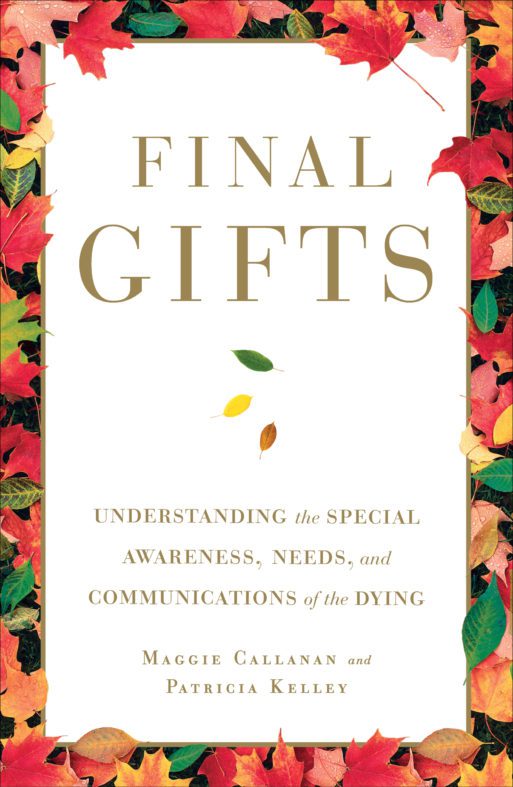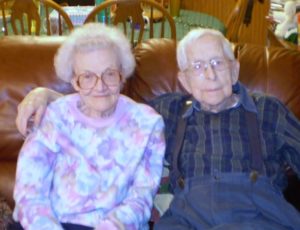 Maggie Callanan and Patricia Kellley, the authors of “Final Gifts,” are hospice nurses with years of experience in the care of dying patients. In the course of their experience, they noticed that people close to death began to communicate their feelings and needs using metaphors and references to things in the past.
Maggie Callanan and Patricia Kellley, the authors of “Final Gifts,” are hospice nurses with years of experience in the care of dying patients. In the course of their experience, they noticed that people close to death began to communicate their feelings and needs using metaphors and references to things in the past.
For instance, one couple who had been married many years loved to travel. When the woman developed a cancer that spread rapidly throughout her body, her husband took care at her home with the help of hospice. One day the husband called the hospice, concerned that his wife had become confused. “It’s time to get in line,” she kept repeating, “but my husband can’t come.”
Through a series of gentle questions, the husband and nurse figured out that the woman was talking about lines related to travel — security lines, lines to board a flight, and so forth. The husband asked his wife if she was planning to take a trip. The woman smiled and nodded. Then her face grew sad, and she said again that her husband couldn’t come.
The man took his wife in his arms and told her it was all right to take this journey alone and that he would be with her later. The next morning, the woman died peacefully.
The authors offer several other experiences of what they call “nearing death awareness.” Some people say they are in the presence of a loved one who has died. Sometimes the person will actually speak to these unseen visitors. Other times someone will look at an empty space in the room and smile and wave. Some, like the woman in the first example, want permission to die or to express the things they need to die in peace.
Another common theme is the terminally ill person intuiting when they will die. For instance, one of the authors was taking a two-week vacation. She said goodbye to a patient who was not expected to die for several more months. The nurse said, “I’ll just be gone for a couple of weeks, and I’ll see you in a couple of weeks.”
“But I won’t be here,” the patient said. “I won’t be here.” Sure enough, the patient died during the nurse’s vacation.

I had a brush with nearing death awareness when my father passed away. Although my sisters and I had always known he loved us, he wasn’t the type to say so. The Christmas before he died, he gave each of us a gold and diamond necklace inscribed with the words, “My little girl once, my friend now, my daughter forever.” He died three months later. I think he knew he would not be there for another Christmas, and he wanted to find a way to communicate his love to us. I knew he hated to talk about his emotions, but I thanked him profusely and told him how much he had meant to me as a father. He didn’t say anything, but he seemed pleased and genuinely moved.
Not only is “Final Gifts” entertaining, it is chock full of information for people who are terminally ill, their loved ones and the professionals who care for them. I worked as a hospice social worker for seven years, and referred to this book many times when I was trying to communicate with my dying patients.

 “Final Gifts: Understanding the Special Awareness, Needs, and Communications of the Dying” by Maggie Callanan and Patricia Kelley
“Final Gifts: Understanding the Special Awareness, Needs, and Communications of the Dying” by Maggie Callanan and Patricia Kelley


 Our Monthly Tip: Make an “In Case of Death” File to Ease Loved One’s Grief
Our Monthly Tip: Make an “In Case of Death” File to Ease Loved One’s Grief
 Passing of Beloved Comedian Births a New Comedy Festival
Passing of Beloved Comedian Births a New Comedy Festival
















I just finished reading this book and thought it was phenomenal! So glad you and your sisters had some closure before your Dad’s passing. My Mom died July 4, 2016 and 5 weeks before she died (she was in nursing home) she said she thought she had 3 to 6 months left to live. Her decline happened within 15 hours and she had hospice, so I believe she timed her death — it was 5 weeks after I flew down to Fla. and had her 85th BD party in nursing home for her.
Dawn
Report this comment
I just ordered this book yesterday. I am hoping it will help when my grandmother passes. She has dementia. She is not in the late stages of it. But in the nursey home she was getting up because she said her parents were coming to get her. They passed long ago. She fell and got banged up pretty bad but she thinks a girl did it on Halloween night. I don’t want to be negative I love her with every bit of my heart but I am afraid her time may be coming soon. I am really looking forward to the read. Thank you very much. -Shannon
Report this comment